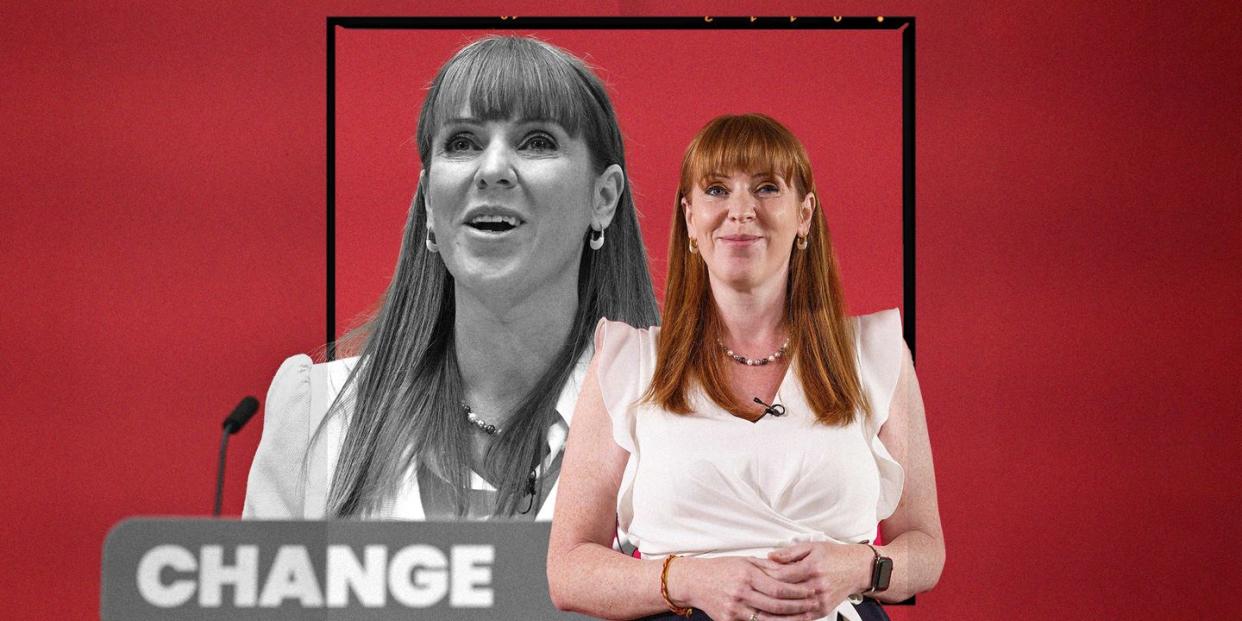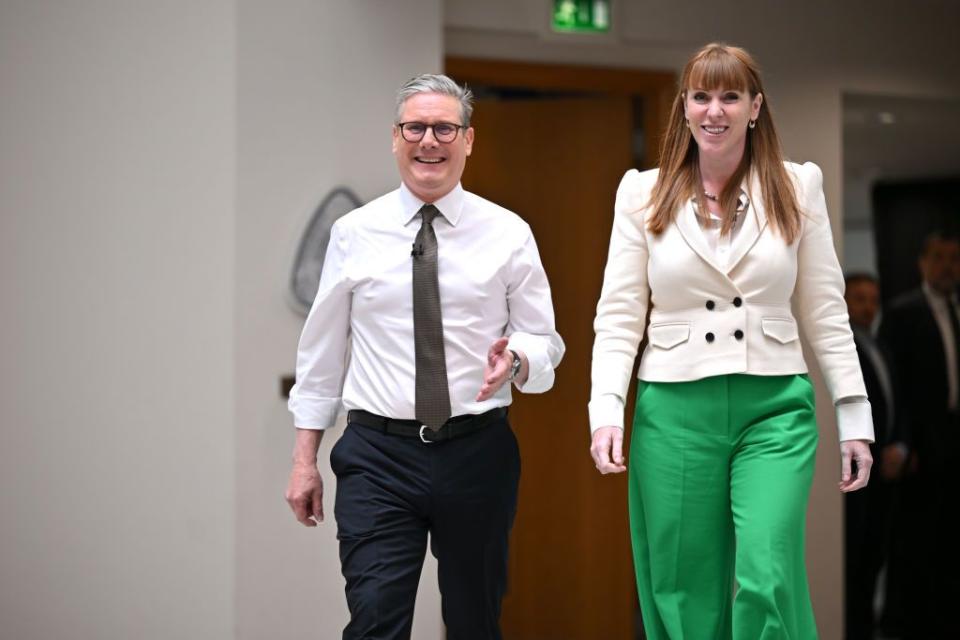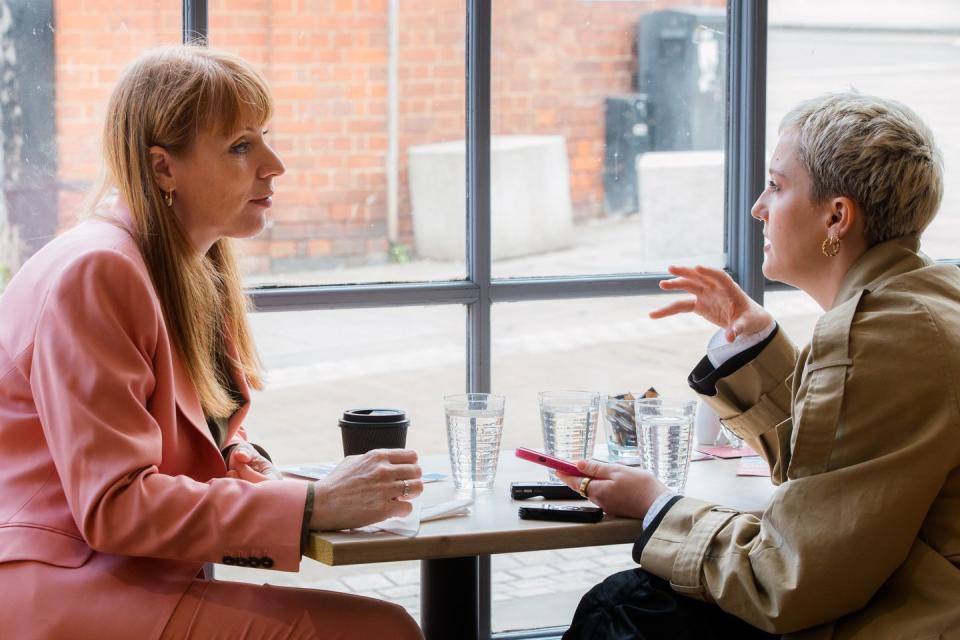Labour’s Angela Rayner: “I’ve seen the damage done by guys from private schools. I can do better than that”

On a small high street in Kettering, Northamptonshire, two women — one in a Clinton-esque pink trouser suit and box-fresh trainers, another in proud Labour red — are pulling a crowd. One kneels down to pet the resident dog inside the Magnolia florist which is enthusiastically barking. Shop owners stand in their doorways observing the sudden flurry of activity of a political campaign in full swing.
Deputy Labour leader, Angela Rayner has come here today to team up with political hopeful Rosie Wrighting who, at just 26-years-old, has downed tools in her role as a buyer at ASOS to stand as the Labour candidate in this, her hometown. The pair are taking a lap of the town centre to meet local business owners as part of Labour’s five-point plan to reinject life into British high streets.
If polling is to be relied upon (though after Brexit and Donald Trump’s election in 2016, we would perhaps be wise not to), Labour is looking at a landslide victory on 4 July. That spells disaster for the Conservatives, a wipeout that could cost the incumbent prime minister, Rishi Sunak, the Richmond, Yorkshire seat he has held for 14 years. Rayner, meanwhile, the recent MP for Ashton-under-Lyne, Manchester, would become deputy prime minister and Secretary of State for Levelling Up, Housing and Communities. In other words: the most powerful woman in the country.
But that’s still over a fortnight away. Right now, the likely future deputy PM is laughing with the owner of the local vintage boutique, KSN Clothing, lamenting a missed opportunity to bag a bargain. “Wish I had more time, I’d be rummaging. I have an eye for shoes!” Rayner jokes, before adding, “I don’t get out that much these days.” Of course, she has been out – non-stop – since Sunak’s snap election announcement on 22 May, touring the country in her big red ‘battle bus’, replete with fridge and a lettuce – a nod to erstwhile PM Liz Truss, whose tenure at Number 10 was outlasted by a salad leaf following her disastrous ‘mini budget’ that sent the value of the pound into a nosedive. The Labour lettuce, Rayner confirms “unfortunately went a big soggy,” so is no longer on board.
It's this personable approach that has made Rayner Labour’s secret weapon in the 2024 election campaign. Born in Stockport in 1980, Rayner left school pregnant at 16 and has been open about caring duties and not having books as a child because her mother, who suffers with bipolar disorder, could not read or write. Meanwhile, would-be PM Keir Starmer has been repeatedly appraised as ‘robotic’, ‘uncharismatic’ or – as Nigel Farage put it – “Blair without the flair,” with audiences of live TV debates audibly scoffing at his reminder that his father was a toolmaker.

“People feel like the Tories have bashed out any optimism that things could get better, whereas we’ve got a credible plan,” Rayner tells me as we sit down in CafeNess. Labour’s plan focuses on building wealth by removing tax breaks from private schools, a windfall tax on oil and gas giants and eliminating non-dom status (the “non-domiciled” tax loophole which sees those who aren’t permanent UK residents avoid paying tax on foreign income – something Sunak’s wife Akshata Murty was criticised for utilising) and investing in renewables, the NHS and social care.
“When [Labour] left office last time, the NHS had the highest satisfaction and the lowest waiting times,” says Rayner. “And now, under the Tories, we have the highest on record waiting times and the lowest satisfaction.” It is true that NHS waiting lists have sky-rocketed under the Conservatives, at 7.6m as of April 2024 compared with 2.6m when the coalition government was formed in 2010, with satisfaction unsurprisingly decreasing in tandem. “People working in our NHS are literally run ragged and feel like they're not able to deliver the care they want,” she says.
But aside from the top line policies around the triptych of crises facing the country – NHS, housing, cost-of-living – a key focus of several manifestos (with one notable exception: Farage’s right-wing party Reform) has, encouragingly, been around women’s rights. From VAWG to improvements around maternity care and online safety.
“The economy is not growing because half of the workforce are women and we're not investing in the women. This is crazy economically,” says Rayner. Labour’s pledges for women include Shadow Chancellor Rachel Reeve’s promise to close the gender pay gap ‘once and for all.’ “We're going to have a real focus to make sure that women get that equality,” Rayner assures. “Barbara Castle started this over half a century ago, enough is enough!”
Closing the gender pay gap is an admirable – and much-needed – goal but given it currently stands at 14.3% in the UK, which experts predict could take another two decades to close, it’s no easy task. Add to this that economists argue it is in fact a motherhood penalty – with mothers earning half as much after having children, how does Labour plan to implement this? Will the party be introducing equal maternity and paternity leave or boosted statutory allowances? Their manifesto doesn’t go into details, only referring to “reform to childcare systems” and to introduce “basic rights from day one to parental leave,” and Rayner is similarly vague in her response. She says the party is hoping to enact a “cultural shift” that breaks down the “unconscious bias that the women are the caregivers” – though doesn’t explain how. Though, a mother of three boys and grandmother herself, she has first-hand experience, describing experiences at the school gates: “even the women will say ‘your husband's great, isn’t it great how he picks them up?’ I’m like ‘yeah I’m breadwinning!’”
What Labour is clearer about is a desire to change flexible working. They plan to build on the recent Flexibile Working Act, which was introduced by the Conservatives following lengthy campaigns by charity Pregnant Then Screwed. The Act ensures employees are allowed to request flexibility, but employers don’t have to grant it – something Rayner refers to as “a can't-do as opposed to a can-do attitude”. Instead, Rayner says Labour will ensure it is automatically granted unless there is a critical reason not to. “We saw during the pandemic that businesses were able to be incredibly flexible. And therefore, I don't believe that there isn't that level of flexibility in every employer,” she says.
Elsewhere, Labour is also proposing changes to court systems, to tackle the historically low rape conviction rates of recent years which campaigners argue have seen the crime ‘virtually decriminalised’ in England and Wales. To turn this around, the party is pledging of 80 new rape courts and the installing of specialist sexual offences teams embedded within every police force. “We want women to come forward and to know that they'll be supported through that system,” says Rayner. “It's a scandal that people are waiting 3,4,5,6 – 7 years before their cases are coming to court. That’s not acceptable.” As of January 2024, there were 3,355 rape cases awaiting trial in England and Wales as a result of pandemic court closures, government cuts and barristers strikes.

Labour is also pledging to make misogyny a hate crime (as are the Liberal Democrats), after the proposed amendment to Police, Crime, Sentencing and Courts Bill was defeated in the commons in 2022. They also plan to revisit the Online Safety Act to increase protections for women which Rayner says has been “watered down far too much.” The initial Online Safety Bill didn’t mention women at all, and the final act has been criticised for loopholes when it comes to the spreading of deepfakes – which disproportionally impact women.
“Big online social media operations need to take responsibility for online content […] there should be no excuse for these companies,” says Rayner. “We will be saying to these online companies that we expect you to do more to safeguard people, we wouldn't have it if you had a factory and people were having accidents every day. We would be coming down on them very strongly. We expect [social media companies] to mitigate and to take all reasonable steps to keep our young people safe.” Promising to strengthen the Act, Rayner adds, “it’s awful growing up in the online media world today, I don’t think I could have survived it.”
While online sexism has been a scourge on social media in recent years, with the rise of misogynistic influencers like Andrew Tate contributing to an ideological chasm between girls and boys, beyond social media sanctions, discussions around early years education on consent and gender equality have proved vital. Labour has pledged sex education with a focus on misogyny and consent. “It's got to start really early to make sure that young people can feel that they are safe and secure in their own bodies, and around good and solid relationships and what's considered right and wrong, appropriate behaviour,” says Rayner.
This promise comes following recent Conservative plans to curb sex education among primary school children, particularly when it comes to gender identity discussions. While both the Conservatives and Labour have pledged to implement the Cass review – “I think it's really important, we learned the lessons of that,” Ryaner says – she is also conscious to veer the conversation away from discussions that could risk making children feel like outcasts. “We’ve got to be mindful that far too many of our children are told you don't fit the right mould. That's not acceptable […] teaching them about loving relationships, respect for themselves, respect for other people, I think is really critical. It doesn't have to go into great detail on other aspects.”

Which 'other aspects' she means is not entirely clear, but it’s a careful response about a sensitive topic, which cropped up again this week when Tony Blair waded in on the debate, announcing that “a man has a penis, a woman has a vagina.” Responding to Blair's statement on Question Time last week, Starmer said he agreed with Blair’s position, backtracking on previous comments he had made. In 2021, Starmer clashed with Labour politician Rosie Duffield, who said “only women have a cervix,” which the Labour leader said “it is something that shouldn’t be said. It is not right.”
What does Rayner think of Blair’s statement? “Look, I know what a female is, I know what an adult woman is. And I also know that we have transgender women. And I just think that when people debase people to this, that, or the other, they're pitching people against each other where we don't have to do that.” As part of their manifesto, Labour, like the Conservatives, pledge to retain single-sex spaces, including in hospital wards, whilst also delivering a ‘trans-inclusive ban on conversion practices’ and protections for people to explore their gender identity.
“We've had the Equalities Act, which Labour enacted, which has safeguards for biological women's spaces, we think the guidance should be updated for that – the government have failed to do that,” Rayner says. Her focus though is around safeguarding young people’s mental health. “I think we can support all our communities to get on and I think sometimes some of the language and the rhetoric… I would be very upset if my teenager was hearing that and thinking, ‘gosh, I'm not worthwhile’ – I think we need to step back from that.”
Rayner is more than familiar with the impact of rhetoric, herself being a target of online misogynistic and classist abuse including trolls mocking her Mancunian accent. Changing these views, she says, is “about celebrating difference. That's why I occupy my space. It's like, you don't have to be like me. You can be yourself. I've been criticised for who I am and the way I speak. But I represent a lot of people in our country. And that's incredibly important that we have that diversity in politics, and we challenge and call out when people act in a misogynistic way.” She also warns about homing in on views from social media. “If I just looked at what is said about me on X [Twitter] for example, I might think, gosh, that's what people think. But actually, when I go beyond, there's a huge swell of support out there. We need to spread more positivity to our young people because actually, I think that the larger world is filled full of love and respect, as opposed to the hate.”
Having previously addressed experiencing impostor syndrome as a result of her working-class background, she no longer thinks that way. “I’ve seen all these guys from private schools in suits and I’ve seen the damage that they’ve done and I’m thinking wow I could definitely do better than that.” Working class people, she says, “don't realise what golden nuggets we are. The single mum fighting really hard for their kids and struggling, juggling work with paying their bills, doing the childcare.
“We grow up thinking these important people obviously know more than me. But what I've realised after nine years of being in opposition is I've seen countless prime ministers and I'm like, we can definitely do better than that.” It’s a promise that looks increasingly likely to come true come July.
You Might Also Like


